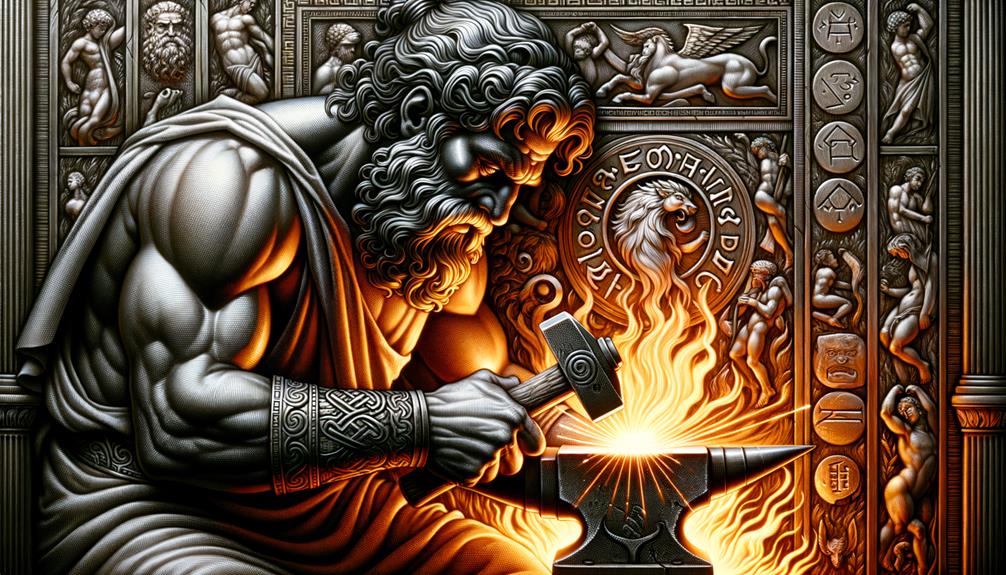Allow me to introduce you to Hephaestus, a figure held in high regard in Greek mythology as the god of blacksmiths. He stands out as the only one born solely from Hera, the queen of the gods. This unique god refined his metalworking skills while living away on the island of Lemnos. His exceptional creations, such as the winged helmet of Hermes and the powerful shield of Achilles, earned him a place of respect among the gods on Mount Olympus.
His marriage to Aphrodite, the goddess of love, was not without its share of turmoil, with clandestine affairs and rumors adding a touch of scandal. Hephaestus is often depicted in art with his blacksmith's tools, and he was venerated in grand temples that were dedicated to him. His story, filled with divine artistry and heavenly intrigue, has left a lasting impression on ancient Greek culture.
So, if you're curious to learn more about Greek mythology, the tale of Hephaestus, a tale of divine artistry and heavenly intrigue, is a great place to start. His influence on ancient Greek culture is profound and his story is a fascinating one.
Hephaestuss Origins and Parentage
Let's chat about Hephaestus, a fascinating character in Greek mythology, who was said to have been born from Hera alone. Now, this wasn't the usual way things happened on Mount Olympus, but Hephaestus was different. Unfortunately, he wasn't what you'd call a looker, and this led to him being kicked out of Olympus.
His journey from Olympus to Lemnos wasn't a pleasant one. Imagine being rejected by your own mother and having to live in exile – it's a heartrending story, isn't it? But Hephaestus wasn't alone; he had Thetis and maybe Eurynome to care for him on Lemnos, where he set up his forge.
But here's where things get a bit muddled. While many believe Hera to be his only parent, other stories suggest that Zeus, the king of the gods, was his father. This confusion only adds to the mystery and intrigue surrounding Hephaestus.
What's undeniable, though, is that Hephaestus was unlike any other god. His birth and upbringing were unique, just like him. He was a god shaped by hardship, but he was resilient, and his natural talent shined through. His story is a testament to overcoming adversity and making the best out of a bad situation.
The Craft and Skills of Hephaestus
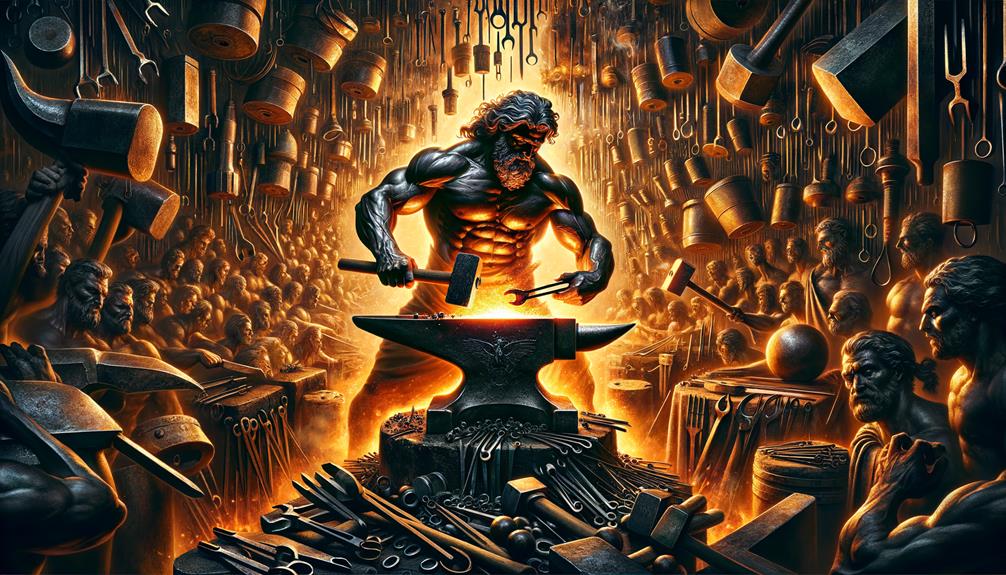
Hephaestus had a bit of a rough start, but he truly came into his own when he discovered his knack for blacksmithing. Among the gods, he was known as the go-to craftsman on Mount Olympus, and his expertise was key to defining the identities of the other gods.
Let's go over some of his best work, shall we?
- He was the one who put together Hermes' winged helmet, giving it that signature speed that we associate with the god of messages.
- Hephaestus also made Aphrodite's girdle, which became known as a symbol of irresistible appeal and allure.
- And let's not forget the formidable shield of Achilles. This was Hephaestus showing off his skills in armour-making, resulting in a piece that perfectly captured the hero's indomitable might.
But Hephaestus' talents weren't just limited to weapons and armour. He also created automatons, like the bronze giant Talos, showcasing his ability to think outside the box. And let's not forget his role in Athena's birth, showing his skills weren't just limited to the forge. Hephaestus' work was as impressive as any Roman temple, with every piece reflecting his divine artistry.
Hephaestuss Marriage to Aphrodite
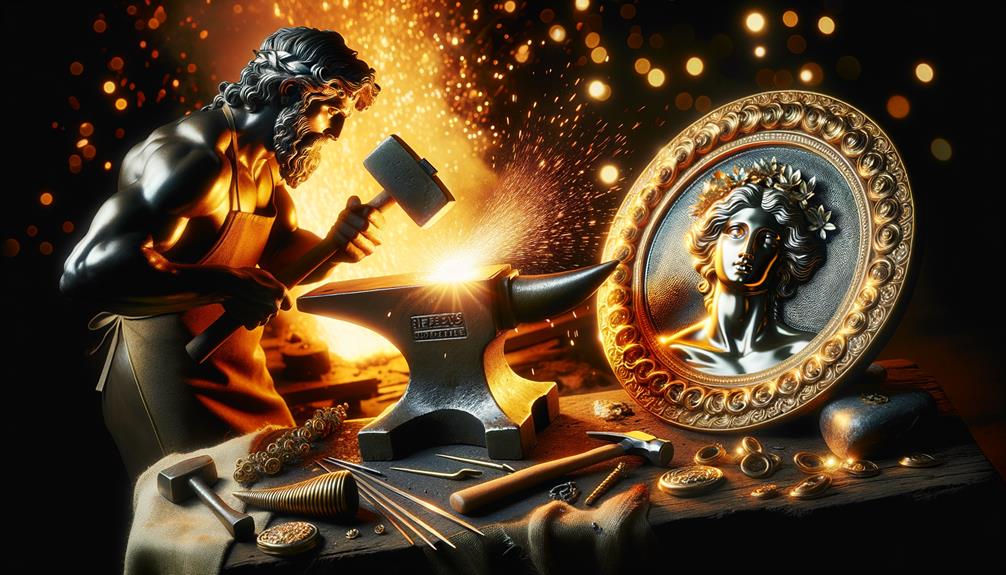
The love story of Hephaestus and Aphrodite is one for the ages, filled with passion, deception, and some clever handiwork. The plot kicks off with Hephaestus' smart capture of Hera, his mother. This twist of events paved the way for his wedding to Aphrodite. But, no love story is complete without a bit of drama. Aphrodite's secret love affair with Ares added just that. However, Hephaestus showed off his skills once more by trapping Ares with his expertly crafted chains. A fascinating recount of this scandalous story is given by Demodocus in Homer's Odyssey.
| Event | Outcome |
|---|---|
| Hephaestus' smart manoeuvre capturing Hera | Hephaestus ties the knot with Aphrodite |
| Aphrodite's secret romance with Ares | Hephaestus traps Ares and Aphrodite |
| Demodocus retells Hephaestus' story | Readers get a peek into the drama of Olympus |
| Ares' escape | Ares makes a dash for Thrace |
| Aphrodite's freedom | Aphrodite heads off to Paphos, Cyprus |
This tale of love, deception, and skill in Hephaestus' marriage to Aphrodite gives us a captivating look into the lives of the Gods of Olympus.
Worship and Representation of Hephaestus
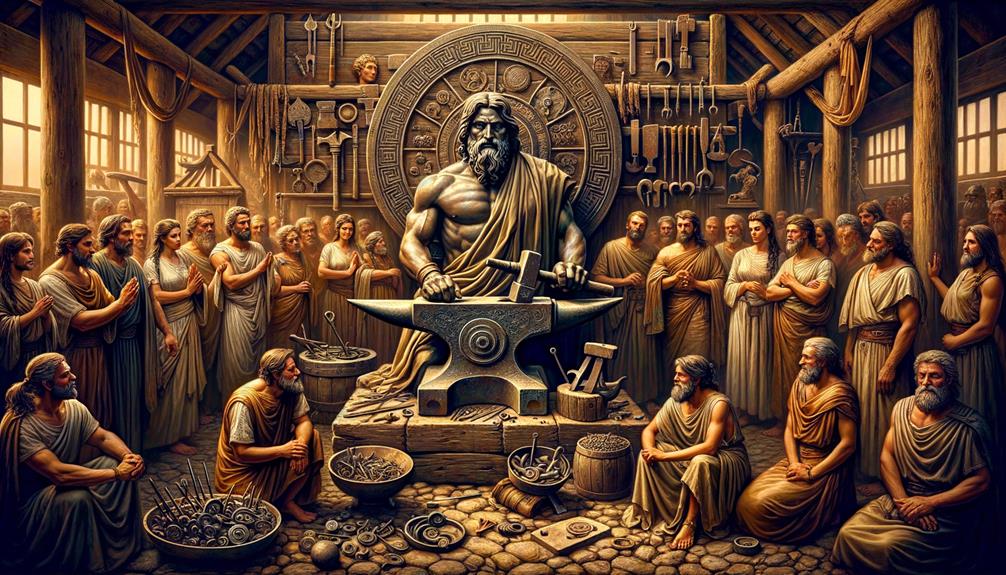
Let's chat about the worship and portrayal of Hephaestus, the god of blacksmiths in ancient Greece. People across the country had a real admiration for him, as seen in the temples dedicated to him and the big celebrations in his honor. In Athens, they even had a Hephaestia festival, where they would march in parades lit by torchlight and make offerings. The Chalkeia festival was another big event where blacksmiths would march through the city. The island of Lemnos was home to a special sanctuary for Hephaestus, with landmarks that celebrated his craftsmanship.
- Hephaestus' temples, especially in Athens and Lemnos, were the main places where people celebrated and worshiped him, often through big festivals.
- At the Hephaestia and Chalkeia festivals in Athens, people would honor Hephaestus by making sacrifices, marching in torchlight parades, and watching blacksmiths parade through the city.
- When it came to art, Hephaestus was usually depicted with a workman's hat, tunic, and tools. These attributes were a clear nod to his identity as the blacksmith god.
Hephaestus in Art and Literature
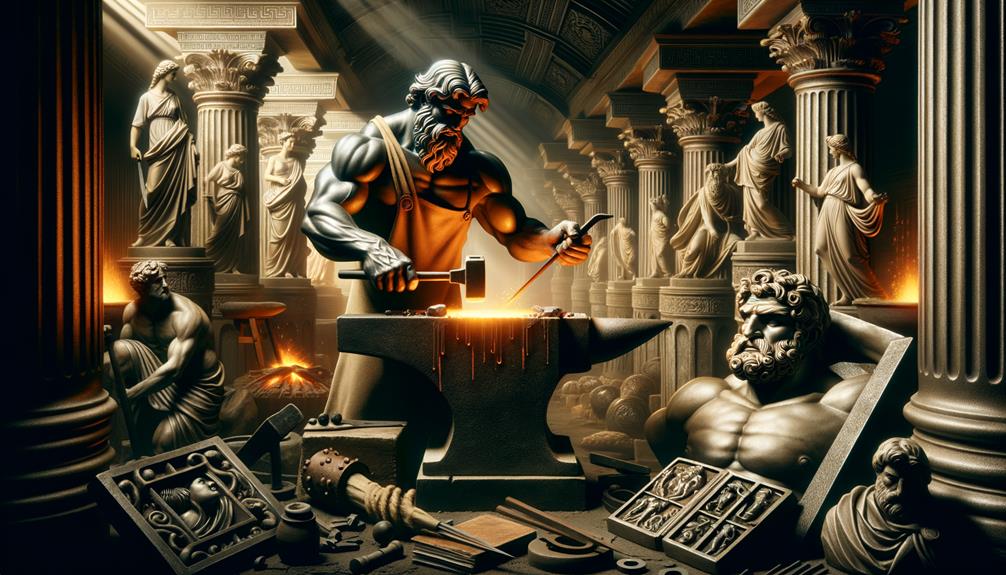
When we look at the world of art and literature, Hephaestus, the god of blacksmithing, pops up quite a bit. You'll often see him sporting his work gear and tools, which really highlights his crucial role in Greek mythology as the go-to guy for all things fire and metalwork. Most of the time, you'll see him rocking a workman's hat and a tunic, tongs at the ready, really playing up his blacksmith image. There's this great visual of Hephaestus on the eastern side of the Parthenon, where he's pictured at the birth of Athena, which really shows how important he was. On some ancient Greek pottery, you'll find Hephaestus cracking open Zeus' head with his axe, which is a key moment leading to Athena's birth. All these artistic images really tie Hephaestus to his role as a blacksmith and his connection to fire and metalwork, solidifying his reputation as the blacksmith god of Greek mythology.
Frequently Asked Questions
Is Hephaestus the God of Blacksmith?
Absolutely, Hephaestus is recognized as the god of blacksmiths. He's quite famous for his extraordinary skill in metalwork. He used his fiery forge to create divine weapons and artifacts that were nothing short of wonderful.
What Does Hephaestus the Greek God of Blacksmiths and Fire Represent?
To me, Hephaestus is all about creativity, smarts, and hard work. He's like a living testament to the amazing things you can do with fire, like transforming a simple piece of metal into a work of art. He stands for the importance of being skilled in your craft and never giving up on your work.
What Weapons Did Hephaestus Make?
Did you know that Hephaestus was quite the craftsman in Greek mythology? He created some of the most famous pieces, like the shield and armor used by Achilles. He was also responsible for Hermes' helmet, not to mention the spectacular golden chariot for Apollo. And let's not forget the silver bows and arrows for Artemis and Apollo. Quite an impressive resume, don't you think?
Who Is the Wife of the Greek God Blacksmith?
Did you know that in Greek mythology, Aphrodite, who's known as the goddess of love, is married to the god famous for his skills in blacksmithing? Their relationship is a bit rocky at times, but they're one of the most well-known couples in many old stories.

